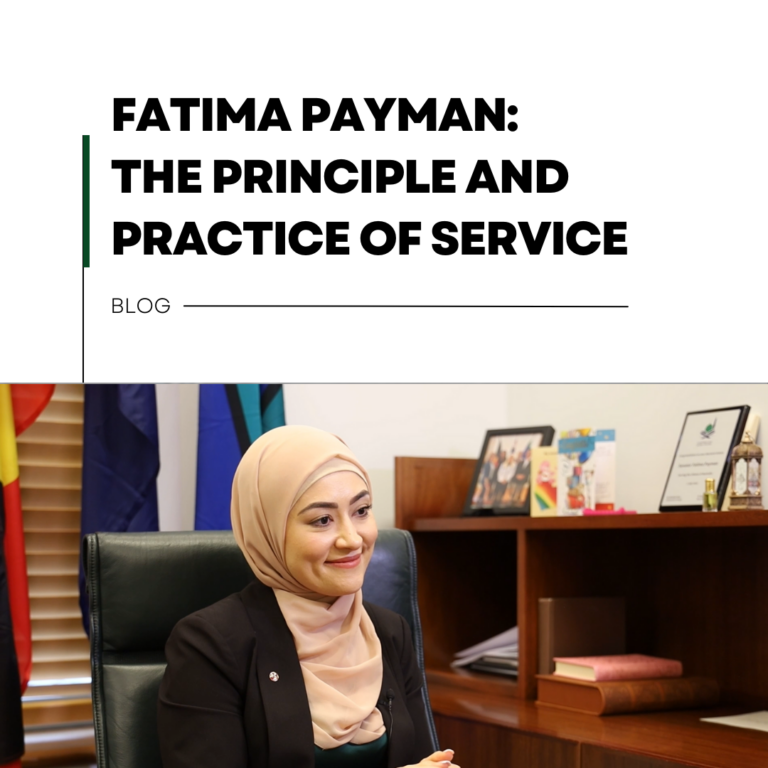Senator Fatima Payman’s first speech to parliament on 6 September 2022 attracted plenty of attention in the media, though it was matters of appearance rather than political substance that featured in many headlines. Payman was portrayed above all as a young Muslim woman and the first hijab-wearing Australian parliamentarian. Also remarked on was the fact that the senator had become visibly emotional during her speech after she had spoken of her late father.
Focussing on age, looks and emotions is not unusual in media coverage of women’s contributions to political life. But for those interested in assessing political substance rather than commenting on matters of appearance, what stands out when watching Senator Payman’s speech again a year and a bit later are not her youth, her hijab, or her momentary choking back of tears, but rather the things she said about the Australian Labor Party’s achievements in the past, and its current objectives, and the way she anchored her own political vocation to the principle and practice of serving the public good:
“After years of volunteering and dedicating myself to the movement, I finally felt my calling. This was going to be my way of serving humanity in my own community.”
In the approach to political representation that Payman pledged to take, the keynote was public responsibility. She made a point of saying that, as “the numbers started creeping in,” and the prospect of winning the third Labor Senate seat in WA for the first time since 1984 became a reality, she “felt the responsibility weighing on my shoulders.” While she didn’t hide an idealistic desire to “challenge the system and to see how far I would go, to see how much ground I could break, to see how much change I could initiate,” it was the combination of this personal enthusiasm with her emphasis on public duty ‒ alacrity plus sobriety ‒ that made senator Payman’s first articulation of political intentions not only appealing but also admirable.
Recounting her meeting with the Honourable Pierre Yang, MLC, Payman described how she came to see participating in Labor politics as a tangible mix of social and institutional elements, in which political representation was the active ingredient in initiating societal change. The basic Labor principle she saw in action here was one that her father had discerned in the party-political life of the country he had come to in 1999; “a firm belief that Labor cared for the working-class people and ensured the wellbeing of everyone on the economic spectrum.” Payman directly connected this Labor principle to a list of practical Labor achievements, in legislation and policy, that she considered had been most significant for Australians; “It was Labor who established Medicare … It was Labor who abolished the White Australia Policy … It was Labor who pioneered superannuation and fought for workers’ rights … And it is Labor who advocates strongly for education.”
In different words, this dialectic of principle and practice was invoked by former Labor Senator Kim Carr in his 2013 book A Letter to Generation Next: Why Labor. Carr called it “government practising what it preaches,” and used the word “innovation” to sum up the reciprocal relationship between Labor’s political outlook and the public results that Labor people should aim to produce, suggesting: “[t]hat’s the real key to the maintenance and repair of our society today.” Carr’s late-career advice to future politicians is separated from Payman’s first Senate speech by several decades of political experience. But the two share a Labor view that politics is fundamentally the work of responsibly serving the public good. For Carr:
“The lifestyle and rights we enjoy today are the achievements of many generations of Australians … For me, and many Australians, it has always been a Labor story. … It’s a story of choices made by individual men and women or groups, often in trying circumstances, and often entrenched resistance, knuckling down and coming up with creative answers. Often they did it in parliament.”
For Payman, the relationship between serving the public good and the Labor achievements she mentioned in her speech was discussed further in an interview with Rabia Sharif, published by Muslims Down Under on 16 September 2022. Talking about her path to politics and her aspirations for her six-year term, Payman said that “Leadership and politics are my way of serving humanity,” and suggested that the impulse to make a contribution “to the progression of this country” can be actualised by producing ideas in common, and by doing useful things with those ideas: “It’s finding those people who are thriving, who are learning, who are keen … and providing them those platforms to really immerse themselves.” The interview with Muslims Down Under is informative for anyone curious about the way Islam and politics are blended into Payman’s approach to public life. She made the connection between her faith and public service in straightforward language:
“Islam is fundamentally based on service, whether it’s service to mankind, whether it’s serving your Creator, whether it’s serving your family, whether it’s serving your community.”
And, as in her first speech to parliament, she evoked the dynamic element as a matter of appreciating opportunities when they come, and using those opportunities to invigorate one’s capacity to make a contribution to the public good:
“We have migrated from our home countries, our Muslim home countries, to seek knowledge … but what are we doing with the opportunities that are laid in front of us, or the opportunities that end up with doors opening up for us?”
Payman linked service as an Islamic principle to social responsibility, located in the nexus between political representation and community life. She suggested that representation of Muslims in Australian society is not something that should be conceived in tokenistic multiculturalist terms so that we can “just throw it around like confetti,” but will rather become meaningful when it involves representation in parliament (“where we make legislation that impacts the lives of so many Australians”), and when it is an aspect of cooperative community life; “the onus now is on our communities to actually take that courage and embrace the opportunities of getting involved, in whatever shape or form.” This nexus between political representation and public solidarity in the service of the public good has much in common with the basic principles of the Australian Labor movement. Kim Carr suggests they were best summed up by George Black, addressing the NSW Legislative Assembly in 1891:
“We have not come into this House, then, to make or unmake ministries. We have not come into this House to support governments or oppositions. We have come into this House to make and unmake social conditions.”
A fresh start to changing social conditions was proposed by Prime Minister Albanese when Labor won the 2022 federal election. In his victory speech Albanese proposed “the two principles that will be part of a government that I lead:”
“No one left behind because we should always look after the disadvantaged and the vulnerable. But also no one held back, because we should always support aspiration and opportunity.”
Cultivating a national environment in which personal initiative and public responsibility can interact in ways that are both fair and innovative is a laudable twenty-first century Labor aspiration. A year and a half after Labor’s 2022 election victory, it is not an aspiration that has been realised on all fronts. Domestically, Albanese’s pledge ‒ “My Labor team will work every day to bring Australians together” ‒ did not suffice to bring Australians together in the Voice to Parliament referendum. And in foreign policy, Labor’s continuation of the Coalition’s AUKUS alliance with Anglophone allies has not heralded a new period of regional multilateralism or Asian engagement.
The degree to which the Albanese government can transfer its principles into practice will be a matter for consideration at the next federal election. How Senator Fatima Payman develops her own nascent political program ‒ based on the principle and practice of service ‒ is something that Australians will be able to observe over the long term ‒ and, if they are keen, engage with. A century ago, in Politics as a Vocation, Max Weber wrote that “Politics is a strong and slow boring of hard boards. It takes passion and perspective.” Fatima Payman’s first speech to parliament stands as an exemplary first statement of political vocation; a statement of the primary importance of responsibility, in making a commitment to serve the public good.
Benedict Moleta is a PhD student in international relations at the Australian National University, commencing 2024. His Master’s thesis (2020, University of Sydney) was on relations between the European Union and Palestine, and he is currently researching Australia’s criminal listing of Hamas. His BA was in German and European Studies, with interests from Lessing to Lenin. Benedict is also a singer. Contact: LinkedIn.





